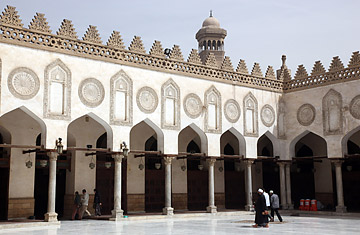
Muslim men visit al-Azhar Mosque in Cairo on March 10, 2010
(2 of 2)
In Friday's speech, al-Qaradawi toed a moderate line in harmony with the revolution, calling for the removal of the corrupt remnants of Mubarak's regime, as well as the release of political prisoners. "I call on the Egyptian army to liberate us from the government that Mubarak formed," he said in the televised sermon. But he also urged protesters to have patience with the Egyptian military and urged striking workers to return to work in the interests of the revolution — sentiments far closer to those of the current military rulers than to many of those in the square.
Many analysts and political activists believe that Islamic extremists will lose out as a more democratic Egypt shapes its religious identity. "The new generation, including the Muslim Brothers and those of them who were in Tahrir Square, have hardly any relationship with al-Qaeda — ideologically, in terms of the outlook, and definitely not organizationally," says Walid Kazziha, a political scientist at the American University in Cairo. "I think al-Qaeda perhaps fears that these young Egyptians have stolen the revolution."
Of course, there will be Islamists among the winners in Egypt's democratic revolution, but those are more likely to be the more moderate Muslim Brotherhood types. Denouncing the Brotherhood has long been a staple of al-Qaeda propaganda tapes, while a portion of the Egyptian group's website is titled "MB versus Qaeda" and is dedicated to bashing extremists. The Brotherhood recently announced that it will form a political party to contest elections as soon as constitutional amendments make that possible — a move that al-Qaeda would take as proof of its accusations of the Brotherhood's treachery against the Islamist cause, which al-Qaeda sees as irreconcilable with democracy.
Although members of the Brotherhood comprised a small minority of protesters in Tahrir Square, their cooperative and humble approach to working with other groups — never trying to lead, as well as their declared intention to refrain from fielding their own presidential candidate — will help them gain ground. "The Brotherhood is a part of this revolution," says Waleed Shalaby, the group's clean-shaven media consultant. "They didn't lead it or come late to it. The Brotherhood is at its heart, and it's part of its basic fabric."
The approach taken by the Brotherhood undercut efforts by the Mubarak regime to present Egypt's political choice as one between the dictatorship and the Islamists. In Tahrir, thousands of Egyptians who had previously had no contact with the Islamist group gained a positive experience. "People think the Muslim Brotherhood are terrorists, but they're not," said Hoor Ahmed Shawky, 17. "They just want fairness and justice."
The plurality that comes with democracy, if it is achieved, could also limit the Brotherhood's popularity, and marginalize the extremist fringes. Although the crowd in Tahrir Square on Friday listened in keen silence to al-Qaradawi's sermon, they represented a greater diversity across lines of age, outlook and social class, cooperating in the interests of establishing a truly democratic arena in which to express themselves. Extremist Islam would only triumph, says al-Azhar's former spokesman Rifaah, if the repression continues. "But if we have a democracy, we will not have a society dominated by one faction or by one religious organization. We will have a balanced society where all trends of thought will be adequately represented."
